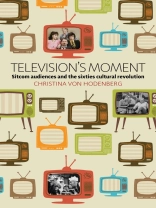Television was one of the forces shaping the cultural revolution of the 1960s and 1970s, when a blockbuster TV series could reach up to a third of a country’s population. This book explores television’s impact on social change by comparing three sitcoms and their audiences. The shows in focus – Till Death Us Do Part in Britain, All in the Family in the United States, and One Heart and One Soul in West Germany – centered on a bigoted anti-hero and his family. Between 1966 and 1979 they saturated popular culture, and managed to accelerate as well as deradicalize value changes and collective attitudes regarding gender roles, sexuality, religion, and race.
Зміст
List of Illustrations, Charts, Graphs and Tables
Preface
List of Abbreviations
Introduction: Negotiating the Sixties
Chapter 1. Three Sitcoms
- Till Death Us Do Part
- All in the Family
- Ein Herz und eine Seele
- Comparison
Chapter 2. Three Settings
- Britain
- United States
- West Germany
- Comparison
Chapter 3. The Era of Limited Choice
- Britain
- United States
- West Germany
- Comparison
Chapter 4. Alf Garnett and the British Lifestyle Revolution
Chapter 5. Archie Bunker and the American Lifestyle Revolution
Chapter 6. Disgusting Alfred and the West German Lifestyle Revolution
Chapter 7. Comedy Against Racism
- Britain
- United States
- West Germany
- Comparison
Chapter 8. Trading TV Bigots: Transnational Trajectories
Conclusion: Television’s Social Impact
Bibliography
Index
Про автора
Christina von Hodenberg is Professor of History at Queen Mary, University of London. She has taught at Berkeley and Freiburg and received a Humboldt Research Award in 2014. Her previous books include Konsens und Krise: Eine Geschichte der westdeutschen Medienöffentlichkeit, 1945 bis 1973 (Wallstein 2006) and Wo ‘1968’ liegt: Reform und Revolte in der Geschichte der Bundesrepublik (co-edited with Detlef Siegfried, Vandenhoeck & Ruprecht 2006).












